The article below was the subject of a Press Council decision issued on June 18th, 2025. That decision can be read in full here.
___________________________________
Last week, a SPHE teacher who has taught the subject over 16 years made a video which went viral where she discussed what she saw and heard on a DCU course providing training to post-primary teachers in regard to SPHE lessons and materials.
In the viral video, teacher Mary Creedon explained that the course that she and other SPHE teachers attended in Dublin City University included lessons featuring “rimming” and “fisting”, and a video which included a graphic animation showing a woman masturbating.
She has now revealed to Gript that other exercises for SPHE taught in the course involved asking students to write a detailed script about a “pleasurable sexual experience” , with “line by line dialogue”, and “notes on actions”, including “physical pleasure”. A word game was used to examine porn terms.
A new specification for SPHE for the Junior Cert (12-15 year olds) was signed off in 2023 – while the specification for the Senior Cycle has not yet been signed off by the Minister, and is now not expected to be finalised until 2025 or 2027.
The DCU course and its activities were designed for teachers at post-primary level which typically begins at age 12 or 13 in first year of secondary school. The outline for the Curriculum module explains that the course supports the curriculum for Junior and Senior Cycle in secondary school.
DID THE COURSE COVER EXAMPLES OF CLASSWORK LESSONS?
The revelations around the SPHE course for teachers comes after parents expressed serious concern regarding changes to the Junior Cert curriculum – which was followed by the publication of new schoolbooks with material that led to controversy.
The DCU course is fully funded by the Department of Education, which means that fees are paid by the Department for teachers attending the course; they are accommodated in taking time off to attend; and the course forms part of a teacher’s continuous professional development requirements.
While Minister Norma Foley has said that the Department does not have oversight regarding the production of schoolbooks, the DCU course was promoted through the Minister’s department in a letter to schools seen by Gript – and was fully funded by same. The SPHE specification for Junior cert is set out in general, high-level statements of learning and outcomes, with leeway for schools and publishers to produce schoolbooks and lessons within that framework.
Lecturers involved in the DCU course brought SPHE teachers through some of the activities – such as an “intimacy” lesson which featured “rimming” and “fisting”.
After the video with Mary Creedon went viral, Minister Norma Foley insisted that the material on the course was only for discussion amongst adults: accusing the teacher of “misrepresentation” – and saying graphic material would not be “ever, ever” shown in the classroom.
But that was not the experience of teachers who attended the course, and who have spoken to Gript about what they saw and heard – and who have provided us with photographic evidence of the lessons under discussion, and with downloads of materials used in the course. Furthermore, Gript has reviewed hours of video and written materials from the course, and teachers were told that the course workshops would explore what the SPHE course material would look like “in a classroom space”, and that creative approaches to teaching RSE/SPHE would be “actively modelled”.
The use of “fictional stories, drama and visualisation” would be explored in the Curriculum module, teachers were told , for example, with a lecturer explaining that new ideas for assessments in the course and workshops could be incorporated into the teacher’s “own practice in meaningful ways”. A “workshop style” and “hands-on” approach to modelling approaches to teachers was adopted, the DCU lecturer said.
The teachers Gript has spoken to say it is “simply absurd to expect anyone to believe that the multiple interactive exercises that teachers were asked to undertake in the course were not examples of classroom exercises” – and say that they raised issues around the appropriateness of the material for school classes during the course.
One teacher pointed to an art exercise where teachers were told to make 3-dimensional penises and vaginas from art materials typically used in school such as play doh and pipe cleaners and balloons.
“Does Norma Foley think that I was making vaginas, breasts and penis with play doh, balloons and pipe cleaners so I would learn about anatomy, or is it a more realistic prospect that it was shown as an example of what we could do with students?” the teacher asked.

Both Mary Creedon and another teacher were present when the contentious ‘intimacy lesson’ was conducted and say that is was clearly a classroom exercise.
“RIMMING” & “FISTING”
“The intimacy exercise, for example, was part of the RSE module in the DCU course: it was given as an activity that could be undertaken with students in class,” the teacher said, referring to the ‘Sexual or Intimate?’ exercise for the classroom where students would be asked to rank thirty words as the most intimate to the least intimate.
The words, as seen in the photo below, included “fisting”, “rimming”, “anal sex” and “mutual masturbation”, along with “holding hands” and “sharing a secret”.
“My reaction, to be honest, was what the hell is this?” the SPHE teacher told Gript. “It is totally inappropriate material for the classroom and I know other teachers felt the same, while others did support the lesson.”
“The course was absolutely giving us examples of things we could do in class, but I feel this would be inappropriate for discussion with school students at any level, to be honest.
“I’m a teacher, and in my experience parents would hate this to be taught”.
The teacher pointed to the inclusion of an eight page lesson on masturbation in a newly-published SPHE schoolbook for the Junior Cert (typically 12-15) – which stated that “even babies and young children know it feels good to touch their own genitals” – as being “totally over the top” – and added that they were told on the DCU course that if they did not address anal sex on the course they were ‘not being inclusive’.
Ms Creedon provided Gript with photographic evidence and slides which revealed what was being taught on the DCU course for SPHE teachers. The intimacy exercise is captured below using the materials provided to teachers in the course.
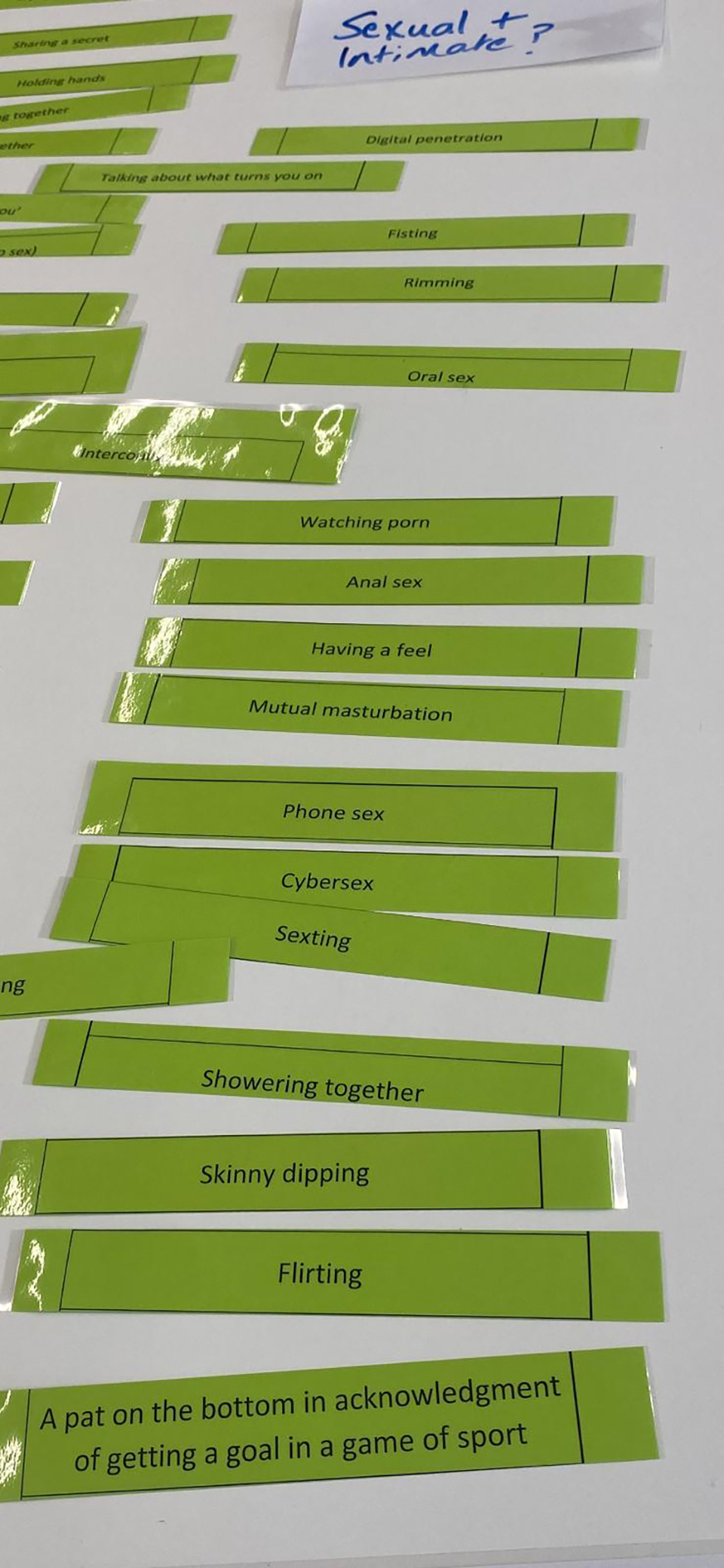
Both teachers said one of the lessons in the DCU course addressed the rights of the child to education, and that this prompted “quite a strong discussion” on the right of parents to withdraw.
Some of those attending the course argued that parents should have no such right to withdraw their child from SPHE.
STUDENTS WRITING ABOUT SEXUAL EXPERIENCES
Another sample activity for the SPHE teachers was named “Rewriting the Script”, which tasked school children with “creating a script that tells a story of a mutually pleasurable, respectful and consensual sexual experience of two people”.
In the story students were to consider emotional/romantic aspect of pleasure as well as physical pleasure.
The exercise says the script “should include detail character descriptions, scene-setting information (where and when it is set, what are the key notes on space etc), line by line dialogue, notes on actions central to scene(s) (non verbal), and any music or sound ques (where applicable).”
“As a SPHE teacher I would have very, very serious concerns instructing young students in our classes to write such a script,” Mary Creedon said.
Ms Creedon provided a photograph of the slide used in the DCU course where the exercise was outlined. In addition, Gript has also seen a download of the research papers, online lectures, and powerpoint presentations, posted to an online folder for teachers in the DCU course.
A further lesson in the SPHE course by Dr Leanne Coll and Dr Ester McGeeney directed teachers in how to answer questions from students such as: ‘What is your best advice on giving head’ and ‘Do chest binders hurt?’ and ‘Do you think there are more than two genders?’.
The slide suggested: “Keep it factual and just be as open and honest as you can. It’s not your job to give advice about how to have good sex or to discuss personal preferences!”
Ms Creedon said that the DCU course, in her view, adopted a gender affirming approach, and she felt it was assumed that everyone supported gender ideology – the belief that gender is not decided by biological reality, and that gender is fluid.
She pointed to the Cass Review which warned that social transition (such as immediately affirming a name change in school) can be a pipeline to medical transition – which can include puberty blockers, cross sex hormones and surgery.
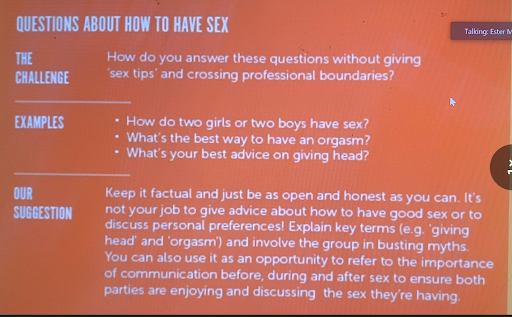
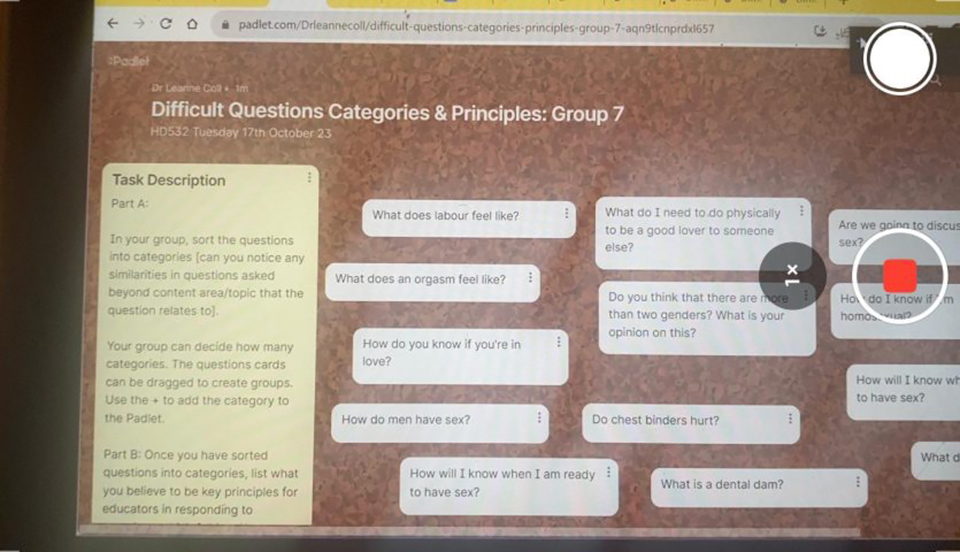
She said that asking teachers to answer questions on chest-binding – especially given that children were asked not to discuss the SPHE lesson with anyone – compounded her concerns regarding child safeguarding issues.
Ms Creedon also pointed to guidance from the NCCA which told teachers: “when you greet your students for the first time, announce your name and pronouns (e.g. “My name is Ms Murphy and my pronouns are ‘she/her’).”
“This signals that you are aware and respectful of the fact that not everyone will use the pronouns that people expect or the name and pronouns that are on official records.”
The NCCA also warned against “grouping children on the grounds of gender, saying this can “silence and exclude some students who may identity as transgender or non-binary.
“For example, you could replace “boys and girls” or “lad and ladies” with phrases like “everyone” or “folks” and you can use “parents and guardians” instead of “Mums and Dads”,” the NCCA guide says.
PORNOGRAPHY
Ms Creedon also provided photographs of another word-sorting activity in the DCU course which dealt with pornography – which the slide said was an activity adapted from ‘Sexuality Education matters and Stepping Out Resources’.
“In this lesson, students would be instructed to sort statements under headings of “Porn World” “Real World “ “Both or Neither”. In groups, these statements would discussed and sorted,” she said.
One statement read: “I’m a great big dick and I’m the star of the show!”, while another said: “Women like sex to be rough and mean”.
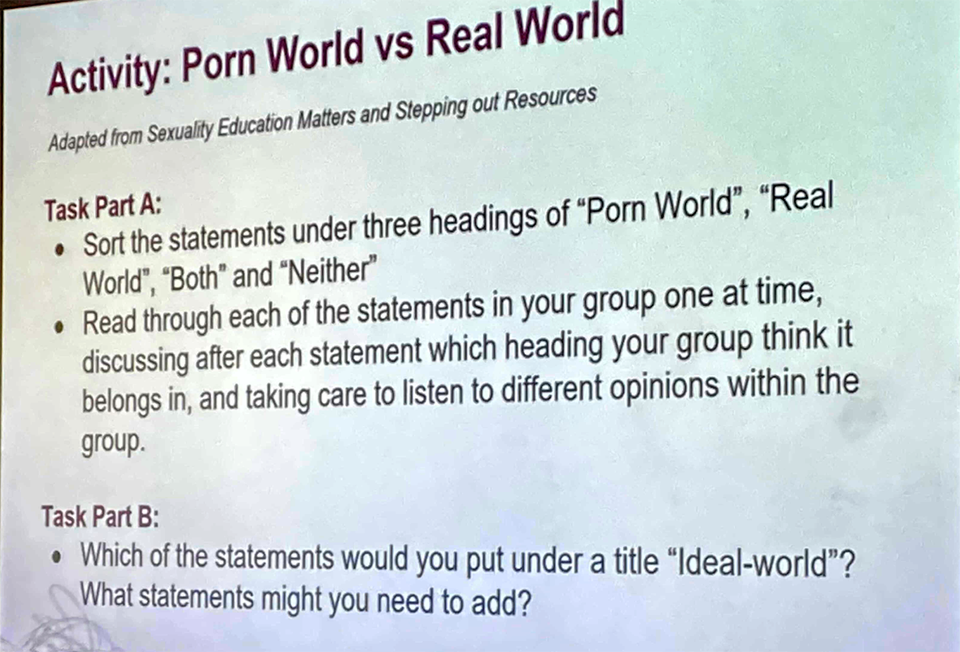
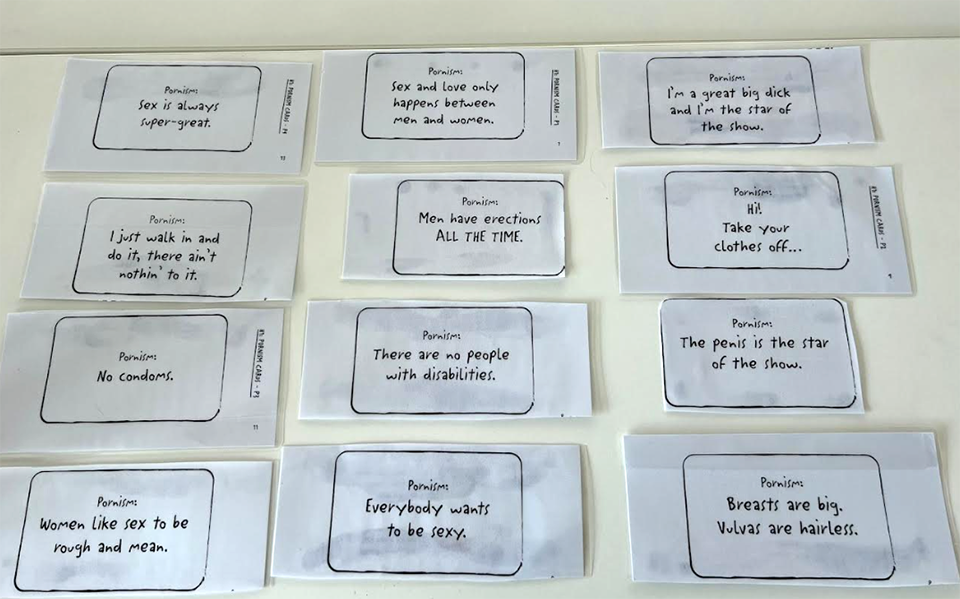
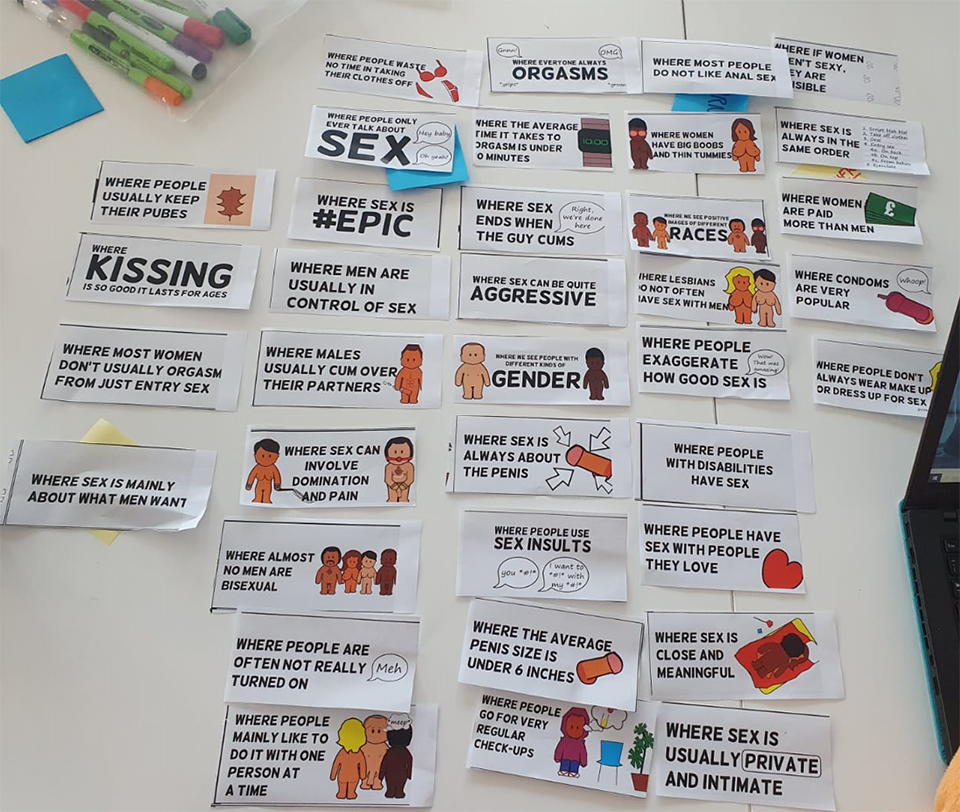
“I felt this exercise would expose school children to graphic sexual statements and phrases that they have to form an opinion on and discuss in a group,” Ms Creedon said.
She said that examining porn in this way, especially in a group setting, was not the approach to porn that parents were led to believe would happen in schools. “Both the porn exercise and introducing the idea of ‘ethical porn’ (below) are not what parents would expect their children to learn in the classroom,” she said.
“The idea of suggesting to young students that some porn – if its ‘inclusive’, for example – can be ethical, is a very bad message, in my opinion,” she said.
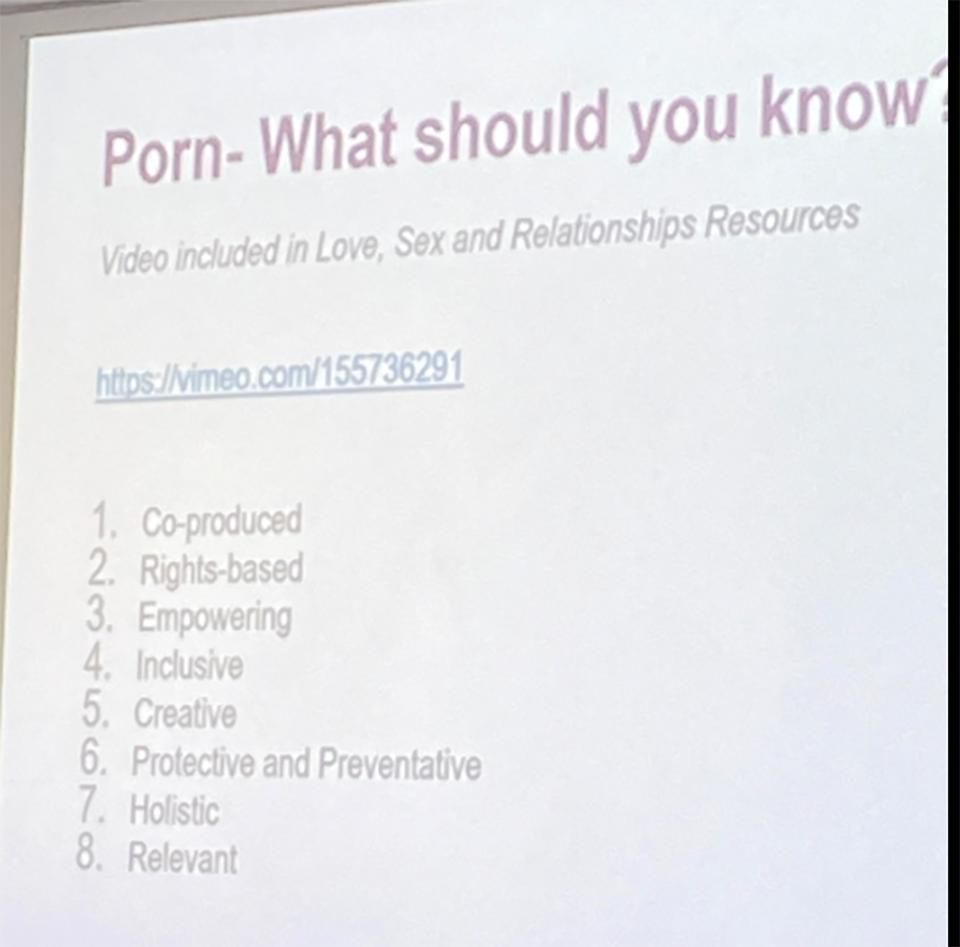
Another slide from the course directed teacher towards a video (which says it for 8 years and upwards, but is recommended for 13-14 year olds ) as a resource. The video says it aims “to help them become critical thinkers about pornography and other sexual imagery (which may not be classified as porn).”
She said that teachers were shown a section of a Swedish video as an example of international resources that were available for students which included an animated video of a woman masturbating and ‘sex-map’ material (below)
“Teachers are attending this course in order to learn how to teach SPHE in schools to children as young as twelve, and this was being presented as an example of the kind of sex education that is being delivered to students,” she said.
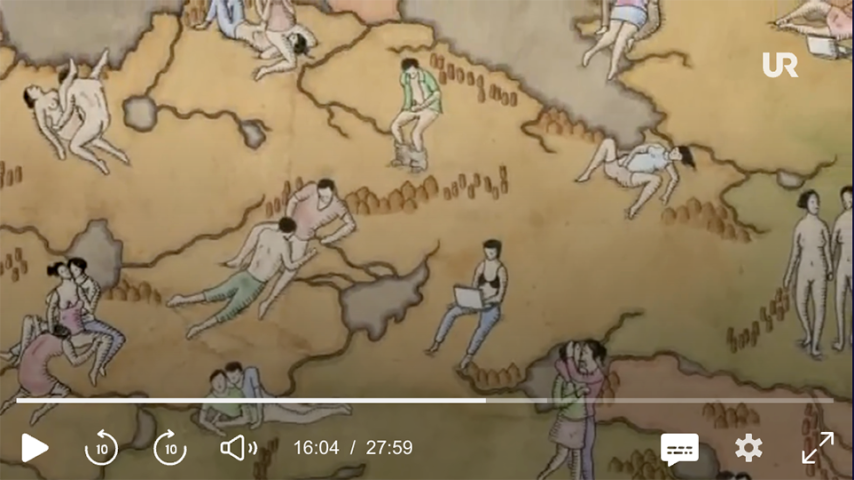
In one online course session seen by Gript which tasked teachers with a “curriculum makers” project, teachers are told they can use international curricula to make material for the curriculum which could be brought “directly into your own practice”.
Ms Creedon said that many SPHE teachers were still unaware of the content of the DCU course. “Most teachers who are teaching SPHE have not attended the DCU course,” she said. “And parents are completely unaware that this material is being presented.”
“We’re already seeing things seep into the schoolbooks, with 8 page lessons on masturbation and teaching gender ideology as if it was fact,” she said pointing to SPHE schoolbooks for the Junior Cert featuring those lessons.
In regard to age-appropriate lessons for 12-15 year olds, she pointed to guidance from the NCCA which said that teachers should “begin by helping students to reflect on their own values and expectations of sexual relationships and what they consider to be the features of a healthy adult sexual experience.”
“Why is the NCCA asking 12-15 year olds to reflect on adult sexual experiences when the legal age for sexual intercourse is 17 yrs?” she asked.
DEPARTMENT OF EDUCATION LETTER
In a letter to schools seen by Gript, the Department of Education said it “is enabling the provision of a postgraduate upskilling programme of study for teachers who aspire to further develop their skills in relation to the delivery of SPHE/RSE in post-primary schools.”
“The programme aims to build capacity and leadership within the teaching profession in relation to SPHE/RSE,” it continued, explaining the course would be offered by DCU.
“The programme aims to upskill teachers’ pedagogical practice and leadership skills in relation to the delivery of SPHE/RSE in post-primary schools. The programme will provide substantial theoretical and practical continuing professional development for each participant. The provision of high quality pedagogical content knowledge in the programme will empower teachers to become an effective teacher in this subject area,” the DoE letter explained.
“This programme is provided by the School of Human Development, in DCU’s Institute of Education and leads to the award of the NQF Level 9 Graduate Diploma in Social, Personal and Health Education/ Relationships and Sexuality Education (GradDip SPHE/RSE).”
“No fee or registration charges will apply for applicants eligible under the terms of this Circular,” the Department said. “Substitution, which must be approved by the managerial authority of the school, will be allowed for four weeks (20 days) duration of release in total.”
DCU were asked for comment for this article, but have not yet responded.
Last week, another SPHE teacher writing on Gript said that “experienced SPHE teachers – who only want the best for their pupils – have felt bullied, side-lined, and treated with contempt” when raising concerns about the new curriculum.
The new SPHE schoolbooks for 12-15 year olds have been a source of repeated controversy in relation to the “anti-Irish” depiction of a family as bigoted; an 8-page classroom lesson on masturbation; a lesson which asked children to respond to a transgender teenager who complained she felt “stupid, with stupid breasts”, amongst other issues.
Last month, the Association of Secondary Teachers of Ireland said that SPHE and RSE programmes include “sensitive issues” and that “teachers should only teach material they feel they are comfortable and competent to teach”.